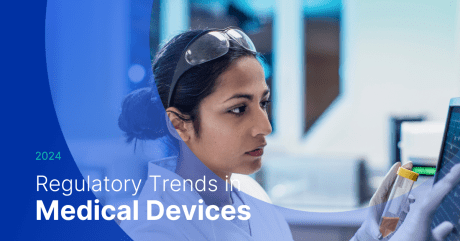
MedTech Forum 2024: 5 Key Insights

This blog was originally posted on 11th June, 2024. Further regulatory developments may have occurred after publication. To keep up-to-date with the latest compliance news, sign up to our newsletter.
AUTHORED BY FERNANDA PARO, REGULATORY COMPLIANCE SPECIALIST, COMPLIANCE & RISKS
Introduction: MedTech Forum 2024
MedTech Forum 2024 took place in Vienna from 22nd to 24th May 2024 and gathered many experts to discuss key topics regarding the Medical Technology sector including data, sustainability, governance, labeling, and others.
In this blog, we provide an overview of 5 hot topics from MedTech Forum 2024.
1. Cybersecurity of European Healthcare
Cybersecurity is a highly valued topic since it represents a crucial key in this technological era and ensures protection against cyber attacks. Although regulations are in place, there needs to be improved implementation, rigorous user awareness training, and stronger governance to ensure cyber defenses are prepared to respond to attacks.
Speakers at MedTech Forum 2024 highlighted the importance of cybersecurity and education including vulnerability disclosure programs, policies for interoperability standards, and accountability for the high management in terms of regulation.
2. Health Data
The use of health data involves an interplay of the Data Act, General Data Protection Regulation (GDPR), Medical Device Regulation (MDR), In vitro Diagnosis Regulation (IVDR), European Health Data Space Regulation (EHDS) and others. These regulations ensure safety, privacy, and security to mitigate unintended risks.
In this regard, harmonization of regulations and application across the Member States is important. The Medical Device Regulation (MDR) and the In Vitro Diagnostic Regulation (IVDR) contain comprehensive requirements for product design and patient safety and they also address the data generated by the use of medical technologies as part of their authorized use, while the Data Act covers a wide range of topics, requiring additional clarification on the specific conditions under which data must be shared and the measures needed to safeguard highly sensitive information. It will therefore be crucial to place the Data Act within the context of the European Health Data Space Regulation (EHDS), to gain a clear understanding of how the provisions interact and to ensure alignment in terms of definitions.
3. Health Technology Assessment (HTA)
The Health Technology Assessment (HTA) is a process that evaluates healthcare technologies, interventions, and treatments. It formulates assessment questions, analyzing and gathering data, synthesizing evidence, and offering recommendations. Regulation (EU) 2021/2282 which deals with the Health Technology Assessment establishes a support framework and procedures to guarantee Member States’ cooperation at Union level, and a mechanism to submit all information about the health technology by the developer and also common rules and methodologies for the joint clinical assessment. This Regulation entered into force in January 2022 and applies as of January 2025.
The European Commission has published several public consultations regarding the application of the health technology assessment regulation, including: Public consultation on implementing the EU Health Technology Assessment Regulation1 and Public consultation on conflict-of-interest rules under the EU Health Technology Assessment Regulation2.
Although the industry still has time to prepare for the regulatory requirements, it is already imperative for companies to establish new internal timelines and processes to introduce drugs and medical devices to the European market. It is essential that companies’ internal resources, skills, and key roles are clearly defined and aligned with this new operational framework.
Despite the numerous benefits in the regulation, the mandatory transition introduces uncertainty for stakeholders, including the complexity of the documentation required for joint clinical assessments (JCAs) submissions, the shortened timeline for preparing a comprehensive submission, the absence of stakeholder input during the drafting of process guidance, and the lack of cohesion among various regulation components, such as joint scientific consultations (JSCs) and JCAs.
4. Digital Label for MedTech
Labeling has a crucial role for products related to human health, as it contains essential information about the equipment, such as usage instructions, expiration date, and other relevant details. However, currently, the labeling process remains manual, often resulting in the label being lost in transit, becoming illegible for various reasons, or other issues that prevent the equipment user from accessing this vital information.
For this reason, the transition from paper labels to digital labels is becoming increasingly necessary. Another point of discussion at MedTech Forum 2024 was the issue of sustainability, as the implementation of digital labels is more beneficial for the environment.
The European Commission introduced Regulation (EU) 2021/2226 regarding the use of electronic Instructions for Use (e-IFUs) for medical devices, which entered into force in January 2022. This regulation updates the conditions and requirements for manufacturers of medical devices, including software under the EMA MDR/IVDR, to transition to a paper-free approach.
As per the MedTech Europe, “the adoption of electronic Instructions for Use (eIFU) for professional use devices began nearly two decades ago in major markets like the US and Canada. This trend continues to expand globally. Extending European legislation to include all professional use medical devices would align with other major markets where eIFUs have been successfully implemented without increasing vigilance cases, promoting regulatory convergence efforts like those seen in the IMDRF”34. To implement the e-label, manufacturers should count with a high level of risk assessment and they should be in compliance with the regulation which will be under the Notified Bodies checking.
5. EU Green Deal and “Circularity4Health”
The current discourse focuses on enhancing the sustainability and environmental friendliness of the medical device industry. This encompasses considerations from product design and lifecycle (including end-of-life aspects) to disposal methods. Manufacturers are prioritizing the development of easier assembly and disassembly processes and the improvement of product recyclability. By reducing waste and costs while enhancing sustainability, circular companies can attract new customers and partners, thereby increasing profitability.
To facilitate this transition, policies and regulations should promote the adoption of circular economy practices in healthcare. This includes providing incentives for the use of recycled materials, implementing regulations to ensure the safe reuse of medical devices, and establishing policies that encourage the procurement of circular products.
The European Green Deal aims to transform the EU into a resource-efficient and competitive economy with zero net greenhouse gas emissions by mid-century. It seeks to leverage global markets for low-emission technologies and sustainable products to achieve climate neutrality by 2050. Achieving this transition requires full industry engagement and active participation from each Member State, with the EU industry strategy leading green and digital transitions to enhance global competitiveness.
The industry is expected to reduce its carbon footprint through affordable, clean technology solutions and new business models. A relevant example is the German National Sustainable Development Strategy (GSDS) and the Lieferkettengesetz 2021 directive. This directive will impact large German companies by 2023 and extend to smaller companies by 2024, ensuring sustainability throughout the supply chain. Such policies, although broadly applicable, should be considered by medical device manufacturers to enhance sustainability and competitiveness in the evolving market.
Conclusion: MedTech Forum 2024
MedTech Forum 2024 was very rich in terms of content and the experts who were present at the presentations. The above were just some of the relevant topics that were addressed. However, there were others worth mentioning, such as: Efficiency & Governance in the MDR and IVDR Maze, Real World Data – a Game Changer for the MedTech Industry, and Navigating EU Regulations Impacting the Use of Health Data in MedTech.
What became very clear in all discussions was the need for unity within the healthcare/MedTech industry for the implementation and harmonization of practices and regulations, as well as the proper application and compliance with the existing regulations and guidelines.
- https://ec.europa.eu/newsroom/sante/newsletter-archives/51414 ↩︎
- https://ec.europa.eu/newsroom/sante/newsletter-archives/53503 ↩︎
- https://www.medtecheurope.org/wp-content/uploads/2022/11/medtech-europe-position-paper-on-eifu-extension-to-all-professional-use-mds.pdf ↩︎
- https://www.imdrf.org/documents/principles-labelling-medical-devices-and-ivd-medical-devices ↩︎
Stay Ahead Of Regulatory Changes
Accelerate your ability to achieve, maintain & expand market access for all products in global markets with C2P – Your key to unlocking market access, trusted by more than 300 of the world’s leading brands.
C2P is an enterprise SaaS platform providing everything you need in one place to achieve your business objectives by proving compliance in over 195 countries.
C2P is purpose-built to be tailored to your specific needs with comprehensive capabilities that enable enterprise-wide management of regulations, standards, requirements and evidence.
Add-on packages help accelerate market access through use-case-specific solutions, global regulatory content, a global team of subject matter experts and professional services.
- Accelerate time-to-market for products
- Reduce non-compliance risks that impact your ability to meet business goals and cause reputational damage
- Enable business continuity by digitizing your compliance process and building corporate memory
- Improve efficiency and enable your team to focus on business critical initiatives rather than manual tasks
- Save time with access to Compliance & Risks’ extensive Knowledge Partner network
Medical Devices Regulatory Updates in North, Central and South America
This whitepaper gives an overview of recent medical device regulatory developments in North, Central and South America to help you keep your medical devices compliant.


